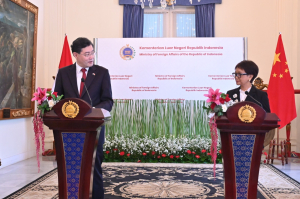Yuan becomes the most-used currency for cross-border transactions, leaving US Dollar behind
The Chinese currency, the Yuan, has finally succeeded in dethroning the US dollar as the most widely used currency for cross-border transactions in March 2023. This success reflects the efforts by Beijing to internationalize the use of the Yuan.
Cross-border payments and receipts in Yuan increase to a record US$549.9 billion in March from US$434.5 billion a month earlier, according to Reuters calculation based on data from State Administration of Foreign Exchange.
The Yuan was used in 48.4 percent of all cross-border transactions, while the US Dollar’s share declined to 46.7 percent from 48.6 percent a month earlier. The volume of cross-border transactions covers both the current and capital accounts.
China has long been promoting the use of Yuan to settle cross-border trade as part of an effort to internationalisz the use of its currency.
According to data from the Society for Worldwide Interbank Financial Telecommunication (SWIFT), the yuan’s share in global currency transactions for trade financing has risen to 4.5 percent in March, while the US dollar contributed 83.71 percent.
Yuan gradually gaining dominance
The latest country to choose the Yuan as a cross-border transaction currency is Argentina. The country has committed to start paying for imports from China using the Yuan instead of the US Dollar.
Argentina plans to pay the value of US$1 billion for its imports from China using the Yuan. Furthermore, approximately US$790 million worth of monthly imports will also be paid in Yuan. Argentine Economy Minister Sergio Massa said that the decision is aimed at easing the critical outflow of US Dollars in its reserves.
In November last year, Argentina also expanded its currency exchange with China by US$5 billion as an effort to strengthen its foreign reserves.
Another South American country, Brazil, agreed to start settling some trade with China in local currencies and took steps to make it easier to transact with China in Yuan.
Both Argentina and Brazil are seeking to reduce their reliance on the US dollar, with officials earlier this year launching discussions on a common unit of account to bypass the dollar in bilateral trade.
Last week, India's neighbor Bangladesh, decided to settle payment for a nuclear plant in Yuan. With sanctions on Russia by the western countries, Bangladesh was struggling to settle payment of US$110 million for the Rooppur power plant. Therefore, the country has decided to pay in Yuan.
Iraq’s central bank has also revealed that it is planning to allow trade from China to be settled directly in Yuan.
Big financial institutions like Citigroup and Goldman Sachs have predicted that by 2030 yuan will become the 3rd most used currency in international payments. However, the internationalization of the yuan will be a long process, and it may face challenges brought by geopolitical factors.
Tag
Already have an account? Sign In
-
Start reading
Freemium
-
Monthly Subscription
30% OFF$26.03
$37.19/MonthCancel anytime
This offer is open to all new subscribers!
Subscribe now -
Yearly Subscription
33% OFF$228.13
$340.5/YearCancel anytime
This offer is open to all new subscribers!
Subscribe now






